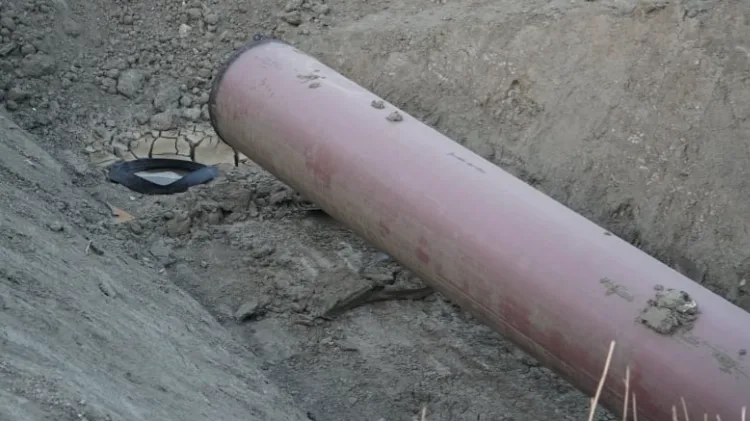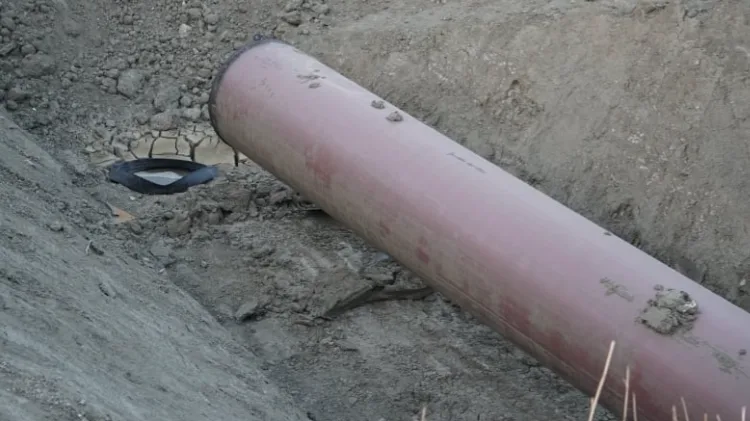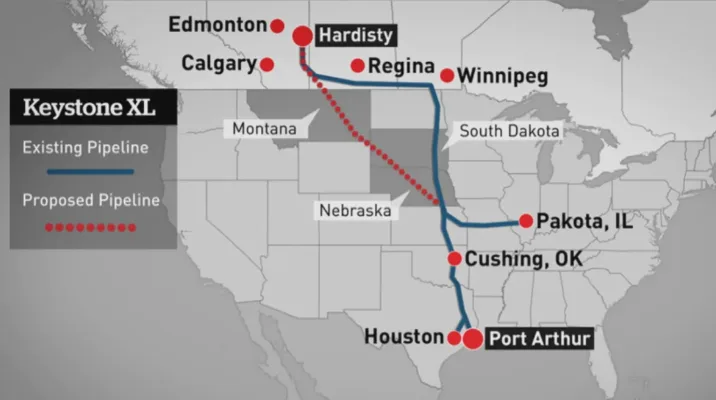
Keystone XL is dead, and Albertans are on the hook for $1.3B
The final cost to Albertans for the Keystone XL pipeline will be about $1.3 billion as the provincial government and TC Energy announced the official termination of the project Wednesday.
"We invested in Keystone XL because of the long-term economic benefits it would have provided Albertans and Canadians," said Energy Minister Sonya Savage in a news release.

A section of pipe is placed in a trench near Oyen, Alta., as part of the Keystone XL project in September 2020. The Alberta government and TC Energy announced the official termination of the pipeline extension on Wednesday. (Kyle Bakx/CBC)
The Alberta government agreed last year to invest about $1.5 billion as equity in the project, plus billions more in loan guarantees in order to get the pipeline moving.
As a result, the Canadian leg of the project had been under construction for several months with around 1,000 workers in southeast Alberta.
If completed, the 1,897-kilometre pipeline, first announced in 2005, would have carried 830,000 barrels of crude a day from Hardisty, Alta., to Nebraska. It would then connect with the original Keystone that runs to U.S. refineries on the Gulf Coast.
PERMIT CANCELLED
That investment vaporized when the Biden administration in the U.S. cancelled the permit for the project on its first day in office.
TC Energy and the province said they would look at their options in the wake of the cancellation, but TC Energy said the pipeline extension was officially dead as of Wednesday.
The company said in a news release that it will continue to co-ordinate with regulators, stakeholders and Indigenous groups to meet its environmental and regulatory commitments and ensure a safe termination of and exit from the project.
Previously, Alberta Premier Jason Kenney said the government would work with TC Energy "to use all legal avenues available to protect its interest in the project."
On Wednesday, Kenney said Alberta would continue to work with its U.S. partners to ensure that the province is equipped to meet U.S. energy demands.
"We remain disappointed and frustrated with the circumstances surrounding the Keystone XL project, including the cancellation of the presidential permit for the pipeline's border crossing," he said in a statement.
Richard Masson, an executive fellow with the University of Calgary's School of Public Policy, says the pipeline was viewed as an essential link between supply and market.
"We end up in a situation now, where those refineries are still looking to get our oil, and we have fewer ways to get it there," Masson said in an interview with CBC's Power & Politics.
"That can result in lower prices for Canadian oil, less investment, fewer jobs, less taxes, less royalties."
Keystone's demise follows cancellations of Northern Gateway and Energy East and a delay in Trans Mountain, which the Canadian government bought in 2019 for $4.5 billion from Kinder Morgan.
In a release, Alberta's Opposition NDP called for the premier to release the full contents of the pipeline deal.
"Today's loss is another example of how Jason Kenney has failed our energy sector. From his embarrassing war room to his overdue and over-budget inquiry, he's failed to create jobs," said Calgary-Mountain View MLA and NDP energy critic Kathleen Ganley in the release.
"Now, his mismanagement and complete incompetence on this file has cost the people of Alberta north of $1 billion."
Environmentalists who had fought the project since it was first announced in 2008 described its cancellation as a "landmark moment" in the effort to curb the use of fossil fuels that contribute to climate change.

"Good riddance to Keystone XL," said Jared Margolis with the Center for Biological Diversity, one of many environmental groups that sued to stop it.
While some Indigenous groups opposed the pipeline, one participated in oil and gas development as a solution to poverty on reserves.
Dale Swampy, president of the National Coalition of Chiefs had complained in January that its cancellation would mean fewer jobs for Indigenous people in construction and supplying goods and services.
This article was originally published for CBC News, with files from the Associated Press and The Canadian Press.











